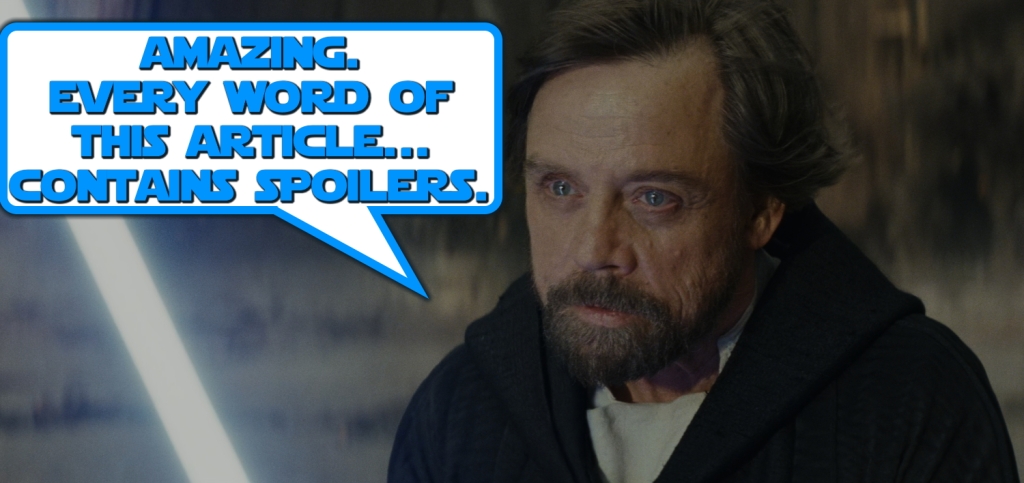
Spoiler Warning: There are spoilers ahead for The Last Jedi, The Rise of Skywalker, and other iterations of the Star Wars franchise.
This article deals with the sensitive topics of depression and mental health and may be uncomfortable for some readers.
The Last Jedi was an incredibly controversial film within the Star Wars fan community. Many people I’ve spoken with greatly disliked it, ranking the film as the worst in the franchise, with some even becoming “anti-Star Wars” as a result. Though recent projects like The Mandalorian have brought a lot of those folks back into the fold, there is still a significant contingent of ex-fans; people who have come to hate modern Star Wars.
There were many points of criticism from The Last Jedi’s detractors – the confrontation between Admiral Holdo and Poe, the hyperspace ramming manoeuvre, the death of Snoke, the Canto Bight storyline, and the character of Rose Tico being just a few off the top of my head. In this essay I’m not going to look at any of these in detail, though I would make the case that, by and large, while I understand the criticisms I don’t feel that any of them overwhelmed the film or made it unenjoyable. Instead I want to focus on what I feel is the most misunderstood point of criticism: the characterisation of Luke Skywalker.

Of those fans who hated The Last Jedi most vehemently, many had been invested in the old “Expanded Universe” of novels, comic books, games, and the like. The Expanded Universe told a wholly different story to that of the sequel trilogy – a generally poor quality, incredibly convoluted and overcomplicated story, in my opinion – but one which put Luke Skywalker at the centre as an invincible hero, taking on all manner of enemies and challenges in the aftermath of Return of the Jedi. To fans who fell in love with that version of Luke – the all-conquering unstoppable hero of fan-fiction – the new version presented by Disney and Lucasfilm in the sequel trilogy is understandably jarring.
Even to fans who weren’t invested in the Expanded Universe, many had built up in their heads over more than thirty years a vision of where the Star Wars galaxy may have gone after Return of the Jedi. At the forefront was Luke and his plan to rebuild the Jedi Order – he was the embodiment, after all, of the “return of the Jedi.” There was an expectation, perhaps not unrealistically so, that Luke would succeed in this task, and that any sequel films which focused on him would depict that. He could be a wise old Master, having trained potentially hundreds of new Jedi in a rebuilt order that would, like the Jedi of the Old Republic, serve as peacekeepers and a check on the power of evil.
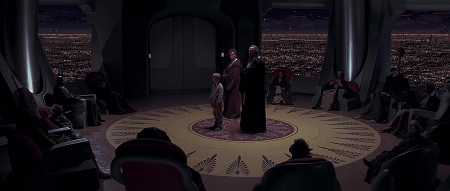
The Force Awakens set up a far bleaker view of both the galaxy as a whole and Luke himself in the years after Return of the Jedi. A new wannabe-Empire was on the rise, led by a dark side user named Snoke. And Luke’s attempt to rebuild the Jedi Order ended in failure when Ben Solo betrayed him, killing most of the students and swaying others to the dark side. Luke himself had vanished.
All of this was a “mystery box;” a style of storytelling common to many projects helmed by The Force Awakens’ director JJ Abrams. Initially contracted to tell the first part of a three-part story – a story that would, unfortunately, be split up and have practically no overarching direction – Abrams did what he does best and created a mystery. Where had Luke gone and why? Was he secretly training more Jedi? That’s what fans hoped, and as Luke stood in his Jedi robe in the final moments of The Force Awakens, that was at least a reasonable assumption.
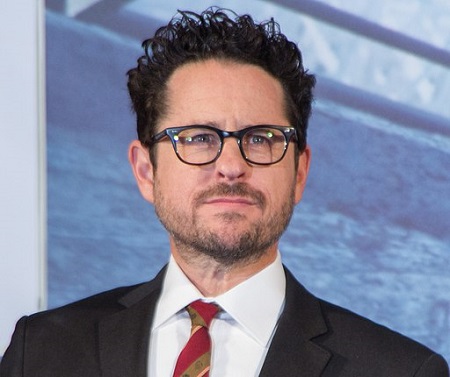
Photo Credit: Dick Thomas Johnson from Tokyo, Japan, CC BY 2.0 https://creativecommons.org/licenses/by/2.0, via Wikimedia Commons.
There was a two-year break in between The Force Awakens and The Last Jedi. For two years, fans speculated wildly about what the new film would bring, crafting intricate theories about all manner of things, including Luke. Many of these were appalling and would have made for awful stories, but fans latched on to some of the popular ones, convincing themselves that their pet theory was true and that The Last Jedi would surely prove it. When I write fan theories of my own – as I often do in the Star Trek franchise, for example – you’ll see me say that these are just theories, and that no fan theory is worth getting upset about. The reaction to The Last Jedi is a big part of why I feel the need to add in that little disclaimer.
Though it can be hard to look back even a few short years and remember the way people felt and the overall mood, especially in the aftermath of the film and its controversial reception, in 2017 the hype around The Last Jedi was growing, ultimately building to fever-pitch in the weeks before its release. This would be Luke Skywalker’s big return to Star Wars having been almost entirely absent in The Force Awakens. What happened after he met Rey on the clifftop on Ahch-To?
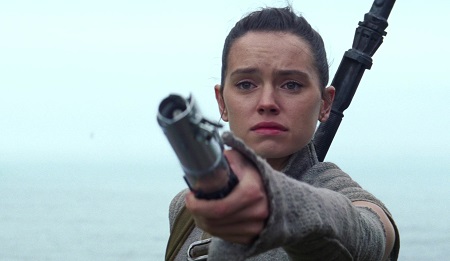
This moment had been built up for two years – and for more than thirty years since Luke’s appearance in Return of the Jedi. There were lofty expectations for what Luke would be and how he might act, informed in part by the Expanded Universe, fan theories, and the like. Those expectations were not met for many fans, because far from being the invincible hero they hoped to see, Luke was jaded, depressed, and uninterested in galactic affairs. When his attempt to rebuild the Jedi Order failed, he didn’t try again. He cut himself off from his friends and from the Force itself, and retreated to Ahch-To to die.
Luke Skywalker suffering from depression is not what fans wanted or hoped to see, but not only is it an incredibly powerful story, it’s one that many fans needed to see, whether they realised it at the time or not. There is an incredibly important message burning at the core of Luke’s story in The Last Jedi – and continued, to a degree, in The Rise of Skywalker. That message is simply this: anybody can fall victim to depression and mental health issues. I absolutely see Luke’s characterisation as a mental health story, and not only that, but one of the better cinematic attempts to depict mental health in recent years. It’s also a story which strongly resonated with me.
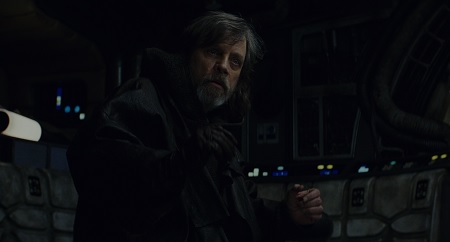
My health is complicated. In addition to physical health conditions which have resulted in disability, I also suffer from mental health issues, including depression. When I saw the way Luke Skywalker was presented: apathetic, lonely, withdrawn, and bitter, I saw myself reflected in Mark Hamill’s wonderful portrayal. Depression isn’t just “feeling sad,” as it’s often simplistically presented in fiction. Depression can be social withdrawal, apathy, a lack of sympathy, unintentional rudeness, and many other things. Luke doesn’t sit around on Ahch-To crying, he sits there overthinking, letting the intrusive thoughts dominate his life. He refuses to let anyone – even his sister or his closest friends – know where he is or help him, taking on the burden of his mental state alone. I’ve been there. I’ve been Luke.
One of the worst arguments put forward by The Last Jedi’s critics was some variant of this: “Luke Skywalker is a hero! He would never have run away. He would never act like this!” People making that argument are, in my opinion, incredibly lucky. It would seem from that ignorant statement that they’ve never had to deal with mental health or depression, either in their own life or with somebody they love and care about. If they ever had, they would recognise something in Luke that would elicit empathy, and a recognition that life isn’t as simple as it seems when you’re a child or teenager – which is when many critics first encountered Luke.
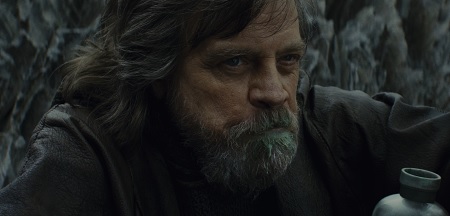
I was born after Star Wars’ 1977 premiere. So anyone of my age or younger quite literally grew up considering Luke to be an epic hero, particularly if they encountered the original films in childhood. I first watched the original trilogy in the early 1990s, and I have to confess that much of the nuance was lost on me in my youth. It’s only going back, decades later, and re-watching the films with a more critical eye that I can spot elements within Luke’s character that clearly set up what The Last Jedi would do.
Luke made a mistake. He may have made a series of smaller ones leading up to it, but the big mistake we see on screen is his wordless confrontation with a sleeping Ben Solo. Luke, fearing the power of the dark side growing within his nephew, very briefly considers killing him. It was a flicker of a thought that lasted mere seconds, but when Ben noticed Luke’s presence and sensed what he was feeling, that was enough to tip him over the edge. What came next was Ben’s transformation into Kylo Ren and the destruction of Luke’s new Jedi Order.
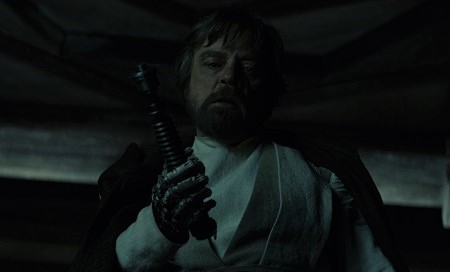
Who among us hasn’t made a mistake? Who among us hasn’t considered or fantasised about – for the briefest of seconds – using violence in a certain situation? Who among us hasn’t had an intrusive thought that makes us feel uncomfortable or ashamed? If you can honestly raise your hand to all three of those points, then you’re very lucky indeed, and perhaps having never had such an experience, it’s easier to criticise others for it. The fans who attacked this characterisation of Luke are either conveniently forgetting their own mistakes, or they haven’t lived. Many are young, and perhaps that’s part of it too. As we get older we experience more, we grow, and we come to realise that no one is invincible, and no one is perfect. Luke Skywalker isn’t perfect, and he never was.
Upon seeing Ben Kenobi killed by Darth Vader, Luke’s reaction was to seek revenge, desperately firing his blaster in the vague direction of Vader. He then sat, depressed and dejected, aboard the Millennium Falcon. Princess Leia – who had very recently seen her family, friends, and practically everyone she knew murdered in the destruction of Alderaan – tried to comfort him, but did Luke ask if she was alright? No. He sat there sulking, selfishly absorbed in Ben’s death not thinking of others.
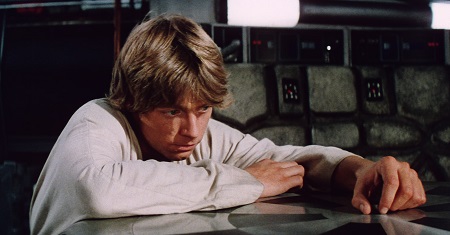
In The Empire Strikes Back, Luke rashly cuts short his Jedi training, casting the Jedi Order aside to do what he believed was right. He ignored the advice of Yoda and Obi-Wan, believing he could take on Vader alone. That hubris ended up costing him his hand, and while he did return to his training afterwards, acting on a whim and doing things while unprepared are innate parts of Luke’s character.
And finally, Luke was tempted by the dark side of the Force in Return of the Jedi. In his final duel with Darth Vader he drew upon the dark side to give him the power to defeat his father, even considering killing the disarmed and defenceless Sith after beating him. That moment alone should be enough to prove to even the hardest of hardcore Luke Skywalker fans that there is, at the very least, a flicker of darkness within him. That he can suffer from those intrusive thoughts that we talked about. That he can act “out of character” when under pressure or in dire circumstances.
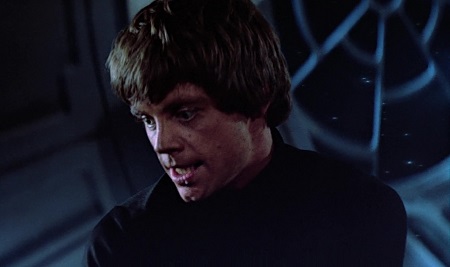
So those points all show that Luke has at least a sliver of darkness, and that he’s capable of making mistakes. He was never the perfect, invincible hero of amateurish fan-fiction in the Expanded Universe. If he had been such a one-dimensional, boring character, the original trilogy would have been an exceptionally dull watch; what made it interesting was the nuance and conflict within Luke.
We also have to keep in mind that it’s been decades since we last met Luke, both within the story and outside it. The Expanded Universe was expunged, and though some fans may still cling to it, it has no bearing on The Last Jedi. Those events, canonically speaking, did not happen. The last meeting we had with Luke prior to The Last Jedi was 1983’s Return of the Jedi, and in the intervening decades he’s been through a lot. No one is exactly the same at age 60 as they were at 30; people change. Sometimes those changes can be positive, sometimes neutral, and sometimes they can be for the worse.
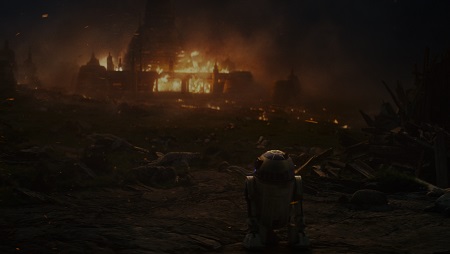
Expecting Luke Skywalker to be the same man we left at the end of Return of the Jedi was naïve in the extreme, and fans should have known that. The experiences of half a lifetime have shaped his character, changing him in many respects into the man we meet at the beginning of The Last Jedi. Because some of those experiences have been incredibly powerful and transformative, there was no way to know how he’d be feeling, but one thing should have been clear: he was not going to be how we remembered him.
We can absolutely argue that seeing Luke’s transformation for ourselves would be a story worth showing within Star Wars, and indeed it could have been an entire trilogy of films all by itself. That’s a valid argument, and perhaps would have quelled some of the detractors’ criticisms had his descent into depression been allowed to unfold on screen. Of all the criticisms of The Last Jedi, this might be the one I consider to have the greatest merit, as it is an undeniable change in the way Luke’s character is outwardly presented, even if many of the elements and much of the groundwork already existed.

Regret can be a very powerful emotion. Anyone who’s actually lived a life will have regrets, some bigger than others. When the feeling of regret becomes overwhelming, depression may not be far behind. That’s what I see in Luke: regret, heartbreak, shame, and depression. His depression was caused by circumstances he believes himself responsible for, so he withdrew. Feeling himself a failure, considering himself incapable of guiding a new generation of Jedi, and ashamed of his actions, he became bitter and jaded, and travelled to Ahch-To to hide away and await the end of his life.
When you try your utmost at something and truly give it your all – as Luke did when training his young Jedi – failure can be devastating; even more so if that failure feels like it’s your own fault. Telling someone in such a situation to “just try again” is missing the point and demonstrates a clear lack of empathy. Luke wasn’t ready to train anyone else. He felt that the rise of Kylo Ren and the deaths of his students was his own fault; training anyone else could lead to a similar disaster, and he just can’t handle the thought of that. It takes time for someone feeling this way to even be willing to try, and it isn’t something that can be forced.

The lack of empathy for Luke shown by some critics of The Last Jedi was truly sad to see. Even with very limited knowledge of mental health, seeing someone suffering as Luke was should prompt a degree of empathy – at least, in anyone with a heart. When I saw the misunderstandings and the lack of empathy from people attacking the film, saying things like “Luke Skywalker is a hero, he would never be depressed!” I honestly felt upset. These kinds of statements, born of ignorance, not only went after what I saw as the film’s core emotional message, but they also showed that, on a fundamental level, as a society we have a long way to go when it comes to understanding mental health.
And this is why someone like Luke Skywalker becoming depressed is so important. It shows clearly that anyone, no matter how “strong and brave” they seem on the surface, can fall victim to this insidious illness. In Luke’s case we can find the cause – the loss of Kylo Ren to the dark side, and the deaths of his students, all of which he blames himself for. But in many cases, depression can hit someone from nowhere, coming out of the blue and bringing someone’s world crashing down. Seeing a character like Luke Skywalker go through this is incredibly powerful because it tells people suffering from depression that they aren’t some kind of freak; depression is normal and can happen to anyone.
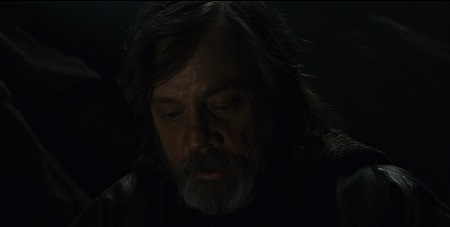
Young men in particular need to hear that message. The availability and quality of mental healthcare is improving compared to even a few years ago. But there is still a huge stigma around mental health, particularly for men. There’s a sense among men that in order to be “macho” or “masculine” you mustn’t show any weakness or vulnerability, and admitting to something like depression carries with it a stigma as a result. To take one of the most important characters in a massive entertainment franchise which probably still has a majority-male audience shows to young men that depression is real, it’s nothing to be ashamed of, and maybe, just maybe, the way Luke was presented in The Last Jedi actually helped someone out here in the real world. I know that it helped me.
It’s okay to be disappointed in a work of fiction, especially if it’s something highly-anticipated. I don’t pretend to tell anyone how to feel about The Last Jedi or the way Luke is portrayed in it; works of fiction are, despite what some of the film’s detractors like to say, subjective. But where I absolutely feel that people need to be willing to consider things from “a certain point of view” (as Ben Kenobi said in Return of the Jedi) is the way the film deals with mental health. You can disagree with me about Luke till you’re blue in the face if you believe he acted “wrong” or you didn’t like the performance or the storyline or for any one of a number of reasons, but don’t make the ignorant, asinine argument that “Luke would never be depressed.” Depression does not work that way; you don’t get to choose if it afflicts you, and being a strong, heroic character is no guarantee of avoiding it.
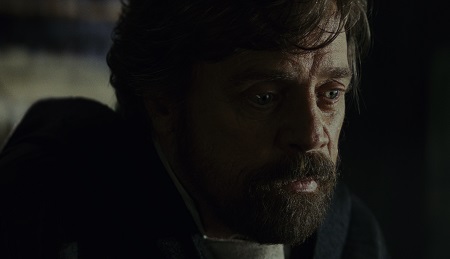
I sat down to watch The Last Jedi several months after it premiered in cinemas. My health precludes me from going in person these days, so I’d heard much of the criticism already. I had relatively low expectations for the film as a result, but I was pleasantly surprised. Not only did it tell a different story within the Star Wars universe, one which didn’t attempt to be a beat-for-beat retelling of a previous title, but specifically because of how Luke was presented. Here was the hero of Star Wars shown to be human. Vulnerable. Relatable. And as much as I disliked The Rise of Skywalker when I saw it earlier this year, it continued a theme we saw in the final act of The Last Jedi: hope.
Yes there was hope for the resistance, for Rey, and for ultimate victory in the galactic war. But that wasn’t all. Luke himself had found hope; he found a reason to believe in something again. Depression isn’t usually something one can just “snap out” of, and in that sense perhaps it’s the least-realistic part of the narrative. But it’s hard to tell a story about depression in two hours that doesn’t have at least an element of that if a character is to find a way out of depression by the end, so I give it a pass on that front.
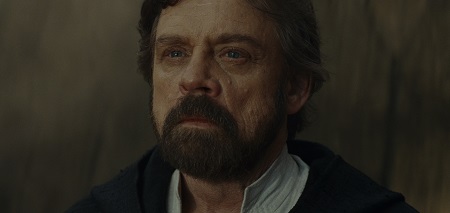
Not only did Luke himself find hope, but The Last Jedi conveys to sufferers of depression a sense of hope. After everything Luke experienced, he was able to move on. He found inspiration and was able to begin the process of getting back to his old self, a process we see continued in his ghostly appearances in The Rise of Skywalker. The way Luke came across in The Rise of Skywalker can feel like fan-service and certainly was a conscious effort to overwrite his portrayal in The Last Jedi, but if you remember that they’re two parts of one story, it’s possible to see the way Luke behaves as indicative of his overcoming depression.
I find that to be a powerful message to end a powerful storyline. Luke became depressed, just like anyone can. But he found a way out. For my two cents, different groups of fans needed to hear those messages, but in different ways. Folks going through their own difficulties needed to see someone like Luke falling victim to this condition to normalise it, to make them consider the way they feel, and perhaps even as a prompt to seek help. They could also see that, despite the way Luke was feeling at the beginning of The Last Jedi, by the end he found a way out; there is light at the end of the tunnel. And fans who have been lucky enough never to have to deal with mental health either in their own lives or with someone they care about needed to see that it’s real. That it can happen to anyone.

The way Luke was presented in The Last Jedi may not have been what fans expected or hoped to see. But it was a powerful story, one which resonated with me and, I have no doubt, with a lot of other people too. It built on what we already knew about Luke from the original trilogy in different, unexpected ways, but ways which were true to his character. His flicker of darkness, his occasional rashness, and his struggles were all present in those films and made Luke the kind of flawed protagonist worth supporting. Those elements remained in his characterisation in The Last Jedi, but so did his innate decency and ability to reach for the best in others and in himself. It just took him some time to rediscover that about himself; a journey that will be familiar to anyone who’s been in that position.
I don’t want to tell anyone disappointed by The Last Jedi that they have to like it. Nor do I want to say that the way Luke was portrayed is something they have to like either. Instead I wanted to present the other side of the argument, to defend Luke’s characterisation, and to explain why it resonated with me. We can disagree vehemently on this topic – and myriad others across fiction – and remain civil.
I’d like to close by saying that, however we may feel about Luke in The Last Jedi, in my mind there’s no way he wasn’t Luke. Some fans latched onto a comment by Mark Hamill saying the character felt like “Jake Skywalker” and not Luke, but I have to disagree. He was always Luke.
The Star Wars franchise – including The Last Jedi and all other titles listed above – is the copyright of Disney and Lucasfilm. This can be a controversial topic, so please keep in mind that this is all subjective. This article contains the thoughts and opinions of one person only and is not intended to cause any offence.

